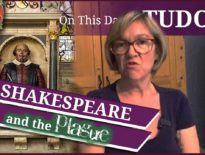On this day in Tudor history, 25th April 1544, an English translation of John Fisher’s Latin work, “Psalms or Prayers”, was published. It had been translated by none other than Catherine Parr, Henry VIII’s sixth and final wife.
It was published anonymously, but there's rather a lot of circumstantial evidence pointing towards Queen Catherine as the translator. Find out more in today's talk.
Also on this day in Tudor history, 25th April 1557, Tudor troublemaker Thomas Stafford, grandson of Margaret Pole, Countess of Salisbury, proclaimed himself "Protector of the Realm". It didn't go down well! Find out what happened in last year’s video:
And here is today's Fall of Anne Boleyn countdown video:
Also on this day in history:
- 1509 – Birth of Thomas Vaux, 2nd Baron Vaux, poet associated with Sir Thomas Wyatt and Henry Howard, Earl of Surrey.
- 1513 – Death of Sir Edward Howard, naval commander, by drowning, in an attack on the French fleet. Edward was the second son of Thomas Howard, 2nd Duke of Norfolk.
- 1526 – Death of Charles Somerset, 1st Earl of Worcester, illegitimate son of Henry Beaufort, 2nd Duke of Somerset, and his mistress Joan Hill. He was buried in St George's Chapel, Windsor.
- 1551 – Death of Alice More, Lady More, second wife of Sir Thomas More. Her exact date of death is not known, but it was around 25th April 1551. She was buried at Chelsea.
- 1557 – “A Masque of Almains, Pilgrims and Irishmen” was performed in front of Queen Mary I and Philip of Spain.
- 1599 – Birth of Oliver Cromwell, future Lord Protector of England, Scotland and Ireland.
- 1603 – Burial of Katherine Howard, Countess of Nottingham, eldest daughter of Henry Carey, 1st Baron Hunsdon, at All Saints, Chelsea. Elizabeth I was said to be very distressed at her friend's death.
Transcript:
On this day in Tudor history, 25th April 1544, an English translation of John Fisher’s Latin work, “Psalms or Prayers”, was published. It had been translated by none other than the queen, that is to say Catherine Parr, Henry VIII’s sixth and final wife.
The work was published anonymously by the king’s printer, Thomas Berthelet, but Janel Mueller, editor of “Katherine Parr: Complete Works and Correspondence”, points out there is “considerable circumstantial evidence” to point to Catherine as the translator.
Here is the evidence:
• On 12th May 1544, Thomas Berthelet submitted a bill to Catherine’s clerk of the closet for twenty copies of the book.
• The two extant copies from this print run were gifts from Catherine to her husband, Henry VIII, and her brother, William Parr.
• The book’s two concluding prayers appear “timed to coincide with Henry VIII’s military expedition against France.” “A prayer for the King” was adapted from Fisher’s original work and “A prayer for men to say going into battle” may have been composed by Catherine herself. Mueller points out that these two prayers were contained in the book “Prayers or Meditations” which was published in 1545 under Catherine’s own name.
• Nicholas Udall, who worked with the queen on an English translation of a work by Erasmus, praised Catherine in a letter for her work on “godly Psalms”, although he could have been commenting on Catherine’s other works.
Susan James, Catherine’s biographer, concurs with Mueller’s conclusion that Catherine was responsible for this translation, writing
“Fourteen presentation copies ‘of the psalm prayers’ ordered by the queen from the king’s printer, half of them sent to her almoner, who was presumably the inspiration for the project, less than a week after the publication of the English translation of Psalms or Prayers, and including prayers known at court to have been written by the queen, is a fairly strong indication of the royal source of the translation.”
James also notes that there were a number of bills in the queen’s accounts that summer for further copies of “a book” which were presentation copies that Catherine sent out. James also states that Catherine ordered four crimson velvet bound copies of the book in June 1546 and that she kept one of those copies with her until her death in 1548.
Mueller and James have convinced me!
I’ll leave you with the prayers said to be Catherine’s composition, “ A prayer for men to say going into battle”:
O Almighty Kyng and lorde of hostes,
which by thy angelles therunto apoynted
doost mynister both warre and peace,
and whiche diddest geue unto Dauid
bothe courage and strength,
beying but a littell one,
unarmed, and unexpert in feates of warre
with his sling to sette upon and ouerthrowe
the great huge Goliath:
our cause now being iust,
and beying inforced to entre into warre and battaile,
we most humbly beseech the
(O Lorde God of hostes)
so to tourne the hertes of our enemies
to the desyre of peace,
that no christen bloud be spilt,
or else graunt (O Lorde)
that with small effusion of bloud,
and to the litle hurte and damoge of innocentes,
we maie to thy glorie obteine victorie:
and that the warres beyng sone ended,
we maie al with one hert and mynde,
all knitte togither in concord and unitie,
laude and praise the:
which lyuest and reignest, worlde without ende.
Amen.



Catherine Parr was studios woman, and this was an excellent video Claire. I am getting so much from the site. I thought the sub was a bit expensive at first, but now I have realised it is a real bargain. I am very pleased I took the step of joining. Thanks for all the work you put into the site.